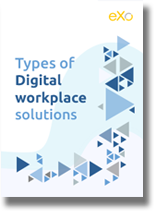- Brahim Jaouane
- April 2, 2019
Tips on how to be a good digital workplace manager

Content
In previous blog entries, we discussed the practices companies have to follow (or avoid) for a better implementation of a digital workplace. Thorough planning, continuous training and communicating the value of the solution to users represent the main pillars of a smooth and successful digital workplace deployment. Alignment with the overall business strategy is also crucial for long term success of the project.
All these best practices will not amount to much if the organization does not have people in place who are able to administer and manage the digital workplace effectively once it is up and running. In this article, we will dive more into the role of a digital workplace administrator/manager and the skills needed to master the position.
1. Key roles of a digital workplace manager
A digital workplace manager is responsible for carrying a digital workplace solution management project throughout different stages. The main responsibilities include:
- Identifying the needs and areas that need improvements
- Choosing the right digital workplace solution topology (be it collaborative intranet, enterprise social network, knowledge management system, etc…) taking into consideration the existing IT setup and the overall business strategy.
- Leading the implementation of the digital workplace.
- Developing intranet policies, guidelines and a content management plan.
- Determining and tracking success metrics (usage, engagement and efficiency metrics).
- Providing training sessions for key users and contributors.
This is quite a long list which proves that the digital workplace manager’s job is a challenging and demanding position which leads many to ask: How to become a digital workplace manager and what are the skills needed to master this role?

FREE WHITE PAPER
Types of Digital workplace solutions
The modern workplace has evolved significantly in recent years, with advancements in technology, the growing number of tools …
2. Top tips for effectively managing a digital workplace
It goes without saying that successful experience with implementing and managing digital workplace projects needs to be considered for such a position. Its list of diversified and multidisciplinary responsibilities requires future managers to be versatile and open to work with different teams to guarantee the success of the project.
Here is the list of traits and focus areas we see in all successful digital workplace manager:
Analytical skills and approach
Analytical skills are listed with abundance in every job offer you find on the internet. Its meaning however differs depending on the company and the position. With every project, managers should determine a set of metrics that will define the success of the project and digital workplace managers are no different. Being able to specify the right metrics to track can make or break a DW project. As a result, it is crucial for a DW manager to be analytical in his/her initial approach to the project, determining the metrics to track right from the start. Common metrics to keep in mind include engagement, usage and efficiency metrics.
Once the data is collected, DW managers perform a thorough analysis of the results and come up with the right recommendations to rectify certain areas in the solution. This requires critical/ analytical thinking and advanced skills in handling analytics and engagement tools like Google Analytics and Lecko Analytics among others.
Focus on employees
As listed above, one of the key roles of a digital workplace manager is to identify the needs and the challenges facing the organization. Digital workplace (DW) managers put employees at the heart of the project by listening to them throughout the stages of the project. Surveys, focus test groups or one-on-one interviews (if needed) are common tools that will enable DW managers to gain a thorough understanding of the employee experience they can gradually build. Once the assessment is done, DW managers can draw a complete list of use cases and requirements that will shape a digital workplace focused on improving the employee experience thus overall productivity.
Communication and strategic vision
Communication is important for the success of any project. DW managers should have the strategic vision and the ability to draw a communication plan in line with the organizational vision. It is crucial to communicate the launch date, provide general information about the project and adequate training to users. This will help in creating a sense of anticipation and prepares employees to use the solution which guarantees great levels of adoption.
Prior to the launch, DW managers collaborate with content creators to prepare a content calendar containing the list of topics and themes that will be shared within the digital workplace. This requires an advanced understanding in communication and content creation.
The success of a digital workplace project depends on a number of factors. Practices to follow and to avoid for a successful digital workplace implementation are widely accessible on the internet. However, project teams especially DW managers are the ones responsible for leading the project and shaping the digital workplace. Their experience and judgement can help carry the project and provide a solution tailored to employee needs.
tools and information
FAQ
You will find here Frequently Asked Questions about digital workplace with all the answers in one place.
What is a digital workplace?
- An evolution of the intranet
- A user centric digital experience
How to launch an effective Digital Workplace?
- Understand users’ needs
- Identify your digital workplace ambassadors
- Build the digital workplace brand
- Training and onboarding
- Plan the big day
What does digital workplace really mean?
How to be a good digital workplace manager?
- Analytical skills and approach
- Focus on employees
- Communication and strategic vision

Related posts
- All
- eXo
- Digital workplace
- Employee engagement
- Open source
- Future of work
- Internal communication
- Collaboration
- News
- intranet
- workplace
- Knowledge management
- Employee experience
- Employee productivity
- onboarding
- Employee recognition
- Change management
- Cartoon
- Digital transformation
- Infographic
- Remote work
- Industry trends
- Product News
- Thought leadership
- Tips & Tricks
- Tutorial
- Uncategorized


